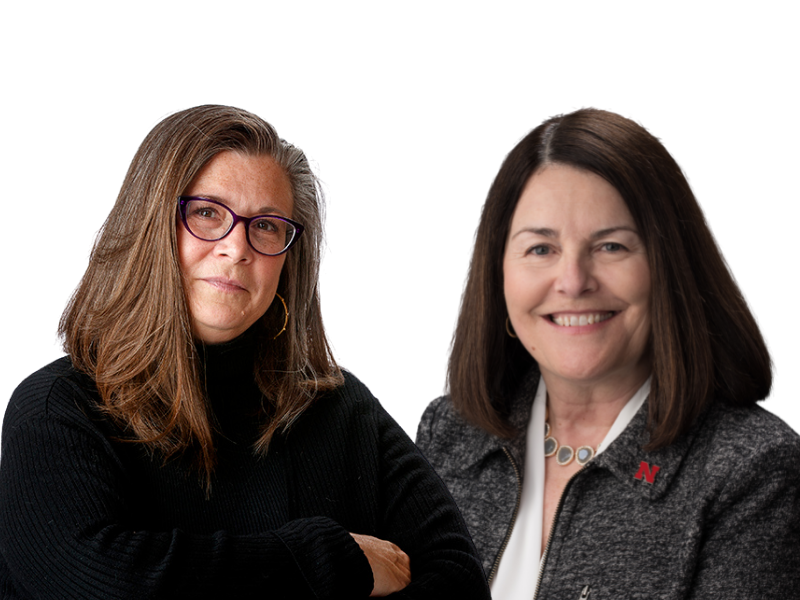
University of Nebraska-Lincoln College of Journalism and Mass Communications faculty members Michelle Carr Hassler and Chris Graves helped 13 Kenyan female journalists learn about solutions journalism in July as part of a U.S. Department of State program.
They joined two others from the university who participated in a six-session virtual workshop, which began July 6. Robyn Murray, assistant director of development communications for the University of Nebraska Foundation, helped organize the event and led a session on multimedia reporting. Ng'ang'a Wahu-Mũchiri, assistant professor of English, was a guest speaker who discussed Pan-African narratives.
The workshop was the brainchild of Lilian Kaivilu, who met the Nebraskans when she participated in the Mandela Washington Fellowship for Young African Leaders at UNL in 2019. The Mandela Washington Fellowship is a program of the U.S. Department of State with funding provided by the U.S. government and administered by IREX. As a co-founder of the Nairobi-based Impacthub Media, which publishes solutions journalism stories, Kaivilu wants to see more Kenyan journalists adopt the practice of solutions journalism, which focuses on rigorous reporting about the responses to social problems. So she worked with Hassler and Murray to develop a proposal for a solutions journalism and multimedia reporting workshop for Kenyan journalists.
Their proposal was chosen for funding in December 2019 by the Mandela Fellowship Reciprocal Exchange, which provides opportunities for U.S. professionals to travel to sub-Saharan African countries or implement hybrid projects to continue collaborative work with Mandela Washington Fellows on the continent.
The original proposal was to hold an in-person workshop in Nairobi in July 2020, but that was changed to a virtual event when the pandemic restricted travel. Graves joined the team shortly thereafter and helped plan the virtual workshop.
Both Hassler and Graves have received solutions journalism training through the Solutions Journalism Educators Academy, sponsored by the Solutions Journalism Network and the University of Oregon School of Journalism and Communication. They also teach solutions journalism courses at UNL.
“It was an honor and privilege to work with such a dedicated and passionate group of journalists,’’ said Graves, assistant professor of journalism. “The journalists were committed to working in-community to showcase the stories that matter most to their regions. I look forward to seeing their published work.”
As part of the workshop, the participants pitched solutions journalism story ideas and received feedback from the presenters and their peers. That was a highlight of the workshop for Hassler, associate professor of practice of journalism.
“I was so impressed with the quality of story ideas pitched,” Hassler said. “Through their pitches, these journalists demonstrated their strong commitment to solutions journalism and an understanding of how it can help their communities become more aware of the ways chronic problems are being addressed. Their passion and enthusiasm for telling these important stories was inspiring.”
In addition to solutions journalism, the Kenyan journalists learned about multimedia storytelling in sessions organized by Murray. Two guest speakers shared their insights: Sarah McCammon, national correspondent with NPR, and Ashley O’Shay, a Chicago-based documentary filmmaker whose work focuses on illuminating marginalized voices.
"Sarah and Ashley shared such valuable insights into multimedia storytelling, and I think they gained as much from listening to the reporting experiences of our participants in Kenya,” Murray said. “It was wonderful to see the sharing of ideas across continents, and I hope to see that continue."
In addition to Wahu-Mũchiri, two other guest speakers shared their insights: Mikhael Simmonds, representing the Solutions Journalism Network; and Daniel Otunge, deputy executive director of Science Africa, a science communication and training company that serves all of Africa from its base in Kenya
One of the workshop goals is to encourage the Kenyan journalists to publish their solutions journalism stories. As part of the program, they each received a stipend to help them cover reporting costs.
"The workshop will go a long way in improving the way solutions journalism is done in Kenya,” Kaivilu said. “For Impacthub Media, this is a great way to collaborate with American professionals, and we believe this is just the start."
Read some of the recently published stories written by the program participants here: https://journalism.unl.edu/news/hassler-and-graves-teach-solutions-journalism-kenyan-journalists